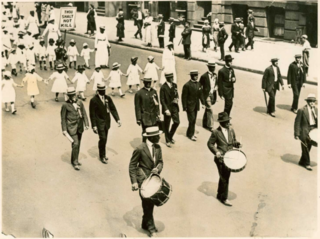 W
WThe anti-lynching movement was an organized public effort in the United States that aimed to eradicate the practice of lynching. Lynching was used as a tool to repress African Americans. The anti-lynching movement reached its height between the 1890s and 1930s. The first recorded lynching in the United States was in 1835 in St. Louis, when an accused killer of a deputy sheriff was captured while being taken to jail. The black man named Macintosh was chained to a tree and burned to death. The movement was composed mainly of African Americans who tried to persuade politicians to put an end to the practice, but after the failure of this strategy, they pushed for anti-lynching legislation. African-American women helped in the formation of the movement, and a large part of the movement was composed of women's organizations.
 W
WThe 2009 Ashura protests were a series of protests which occurred on 27 December 2009 in Iran against the outcome of the June 2009 Iranian presidential election, which demonstrators claim was rigged. The demonstrations were part of the 2009 Iranian election protests and were the largest since June. In December 2009, the protests saw an escalation in violence.
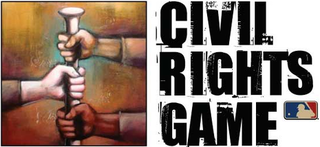 W
WThe Civil Rights Game was an annual Major League Baseball game that honored the history of civil rights in the United States and marked the unofficial end to the league's spring training.
 W
WThe civil rights movement in the United States was a decades-long campaign by African Americans and their like-minded allies to end institutionalized racial discrimination, disenfranchisement and racial segregation in the United States. The movement has its origins in the Reconstruction era during the late 19th century, although it made its largest legislative gains in the mid-1960s after years of direct actions and grassroots protests. The social movement's major nonviolent resistance and civil disobedience campaigns eventually secured new protections in federal law for the human rights of all Americans.
 W
WCivil rights movements are a worldwide series of political movements for equality before the law, that peaked in the 1960s. In many situations they have been characterized by nonviolent protests, or have taken the form of campaigns of civil resistance aimed at achieving change through nonviolent forms of resistance. In some situations, they have been accompanied, or followed, by civil unrest and armed rebellion. The process has been long and tenuous in many countries, and many of these movements did not, or have yet to, fully achieve their goals, although the efforts of these movements have led to improvements in the legal rights of some previously oppressed groups of people, in some places.
 W
WWilliam "Billy" Costin was a free African-American activist and scholar who successfully challenged District of Columbia slave codes in the Circuit Court of the District of Columbia.
 W
WThe Free Speech Movement (FSM) was a massive, long-lasting student protest which took place during the 1964–65 academic year on the campus of the University of California, Berkeley. The Movement was informally under the central leadership of Berkeley graduate student Mario Savio. Other student leaders include Jack Weinberg, Michael Rossman, George Barton, Brian Turner, Bettina Aptheker, Steve Weissman, Michael Teal, Art Goldberg, Jackie Goldberg, and others.
 W
WIlina Sen was a human rights, trade union and feminist activist, as well as a teacher and author associated with the women's movement in India. She died on August 9, 2020 at the age of 69 after battling cancer for several years.
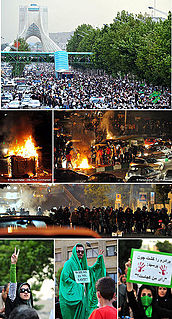 W
WProtests against the results of the highly controversial 2009 Iranian presidential election, a disputed victory by President Mahmoud Ahmadinejad, in support of opposition candidates Mir-Hossein Mousavi and Mehdi Karroubi, occurred in major cities nationwide from 2009 into early 2010. The protests were titled the Iranian Green Movement by its proponents, reflecting Mousavi's campaign theme, and Persian Awakening, Persian Spring or Green Revolution, reflecting the "Persian identity" of Iranians and the so-called "colour revolution" theme.
 W
WJoan Carol Jones was a Canadian businesswoman and civil rights activist who was born in the United States and raised in Ontario, Canada. She was married to Black Nova Scotian and internationally known political activist Rocky Jones, whom she influenced to become more active in the issues of black activism causes espoused by Malcolm X and writer James Baldwin, during the black radicalism period of the 1960s. Together they were among the founders of Kwacha House, an interracial youth club in Halifax and were later instrumental in bringing Stokely Carmichael and the Black Panther Party to Halifax. They adopted the radicalized language of the Panthers and organized with Carmichael's help the Black United Front, taking on issues of police brutality, employment and housing discrimination in the black community.
 W
WLesbian, gay, bisexual, and transgender (LGBT) social movements are social movements that advocate for LGBT people in society. Social movements may focus on equal rights, such as the 2000s movement for same-sex marriage, or they may focus on liberation, as in the gay liberation movement of the 1960s and 1970s. Earlier movements focused on self-help and self-acceptance, such as the homophile movement of the 1950s. Although there is not a primary or an overarching central organization that represents all LGBT people and their interests, numerous LGBT rights organizations are active worldwide. The earliest organizations to support LGBT rights were formed in the early 20th century.
 W
WThe Lily-white Movement was an anti-Black political movement within the Republican Party in the United States in the late 19th and early 20th centuries. It was a response to the political and socioeconomic gains made by African-Americans following the Civil War and the Thirteenth Amendment to the Constitution, which eliminated slavery.
 W
WJames Joseph Patrick McShane was the former Chief United States Marshal during part of the Civil Rights Movement.
 W
W"Mississippi Goddam" is a song written and performed by American singer and pianist Nina Simone, who later announced the anthem to be her "first civil rights song". The song was released on her album Nina Simone in Concert in 1964, which was based on recordings of three concerts she gave at Carnegie Hall earlier that year. The album was her first release for the Dutch label Philips Records and is indicative of the more political turn her recorded music took during this period.
 W
WMarie Frankie Muse Freeman was an American civil rights attorney, and the first woman to be appointed to the United States Commission on Civil Rights (1964–79), a federal fact-finding body that investigates complaints alleging discrimination. Freeman was instrumental in creating the Citizens' Commission on Civil Rights founded in 1982. She was a practicing attorney in State and Federal courts for nearly sixty years.
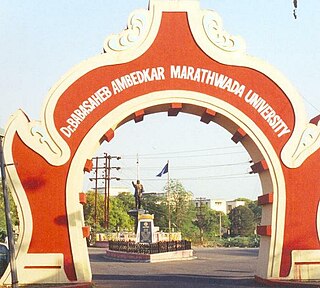 W
WNamantar Andolan was a Dalit and Navayana Buddhist movement to change the name of Marathwada University, in Aurangabad, Maharashtra, India, to Dr. Babasaheb Ambedkar University. It achieved a measure of success in 1994, when the compromise name of Dr. Babasaheb Ambedkar Marathwada University was accepted. The movement was notable for the violence against Dalits and Navayana Buddhists.
 W
WThe Chinese New Citizens' Movement is a collection of numerous civil rights activists in mainland China since 2010. It is promoted by the loosely organized civil rights group "Citizens" with the New Citizens' Spirit: "Free, Righteous, Loving". It is a major component of the civil society movement in mainland China since the beginning of the 21st century. The New Citizen's Movement has close ties to the weiquan movement, but it has clearer and higher-level charter and pursuits. It is a political movement, which hopes to facilitate a peaceful transition of the country towards constitutionalism. It is also a social movement, hoping to facilitate a transition from a "servants' society" to a civil society.
 W
WOccupy Central with Love and Peace (OCLP) was a single-purpose Hong Kong civil disobedience campaign initiated by Reverend Chu Yiu-ming, Benny Tai and Chan Kin-man on 27 March 2013. The campaign was launched on 24 September 2014, partially leading to the 2014 Hong Kong protests. According to its manifesto, the campaign advocates for an electoral system in Hong Kong that is decided through a democratic process and satisfies international standards of universal and equal suffrage. With the first three stages of the movement – dialogue, deliberation and citizens' authorization – the civil disobedience that follows must be non-violent.
 W
WRastafari, also known as Rastafarianism and the Rastafari movement, is a religion that developed in Jamaica during the 1930s. It is classified as both a new religious movement and a social movement by scholars of religion. There is no central authority in control of the movement and much diversity exists among practitioners, who are known as Rastafari, Rastafarians, or Rastas.
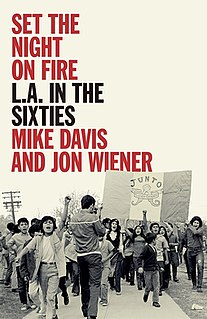 W
WSet the Night on Fire: L.A. in the Sixties is a best-selling book by Mike Davis and Jon Wiener about Los Angeles in the 1960s. The authors combine archival research and personal interviews with their own experiences in the civil rights and anti-war movements to tell the social history or, as the authors term it, "movement history" of this transformative decade. The book's purpose is not to present a comprehensive history of 1960s Los Angeles but to dispel the mythology surrounding this era and replace it with the neglected history of the populist social and cultural movements that shifted power away from an entrenched elite and opened up opportunities for radical egalitarian change.
 W
WStop The Killing KC is a community improvement organization in Kansas City, Missouri patterned after "stop the violence/stop the killing" movements in other large American cities, urged since 1985 by Minister Louis Farrakhan of the Nation of Islam movement, and drawing on lessons learned in past decades by many other community improvement organizations such as urban development programs in various U.S. Cities and evangelical or social outreach programs of various churches, religions or groups.
 W
WThe Syrian Nonviolence Movement is a non-governmental organization formed in 2011 by a group of Syrian activists. They believe in peaceful struggle and civil resistance as a way to achieve social, cultural and political change in the Syrian state and society.
 W
WWheat Street Baptist Church is a historic black Baptist church located in the Sweet Auburn neighborhood of Atlanta, Georgia. Founded in 1869, the current building was constructed in 1921 and is located adjacent to the Martin Luther King Jr. National Historical Park. The church is notable for the role it played in the Civil Rights Movement, especially under the leadership of William Holmes Borders, who served as pastor of the church from 1937 to 1988.
 W
WThe Black Panther Party (BPP), originally the Black Panther Party for Self-Defense, was a Black Power political organization founded by college students Bobby Seale and Huey P. Newton in October 1966 in Oakland, California. The party was active in the United States from 1966 until 1982, with chapters in numerous major cities, and international chapters in the United Kingdom in the early 1970s, and in Algeria from 1969 to 1972. At its inception on October 15, 1966, the Black Panther Party's core practice was its open carry armed citizens' patrols ("copwatching") to monitor the behavior of officers of the Oakland Police Department and challenge police brutality in the city.
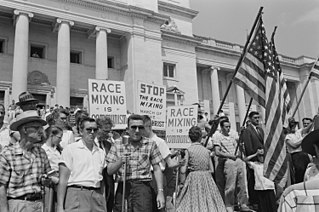 W
WThe Women's Emergency Committee to Open Our Schools (WEC) was an organization formed by a group of socially prominent white women in the city of Little Rock, Arkansas during the Little Rock Crisis in 1958. The organization advocated for the integration of the Little Rock public school system and was a major obstacle to Governor Orval Faubus's efforts to prevent racial integration. The women spoke out in favor of a special election to remove segregationists from the Little Rock school board.
 W
WThe women's poll tax repeal movement was a movement in the United States predominantly led by women that attempted to secure the abolition of poll taxes as a prerequisite for voting in the Southern states. The movement began shortly after the ratification in 1920 of the Nineteenth Amendment to the United States Constitution, which granted suffrage to women. Before obtaining the right to vote, women were not obliged to pay the tax, but shortly after the Nineteenth Amendment became law, Southern states began examining how poll tax statutes could be applied to women. For example, North and South Carolina exempted women from payment of the tax, while Georgia did not require women to pay it unless they registered to vote. In other Southern states, the tax was due cumulatively for each year someone had been eligible to vote.